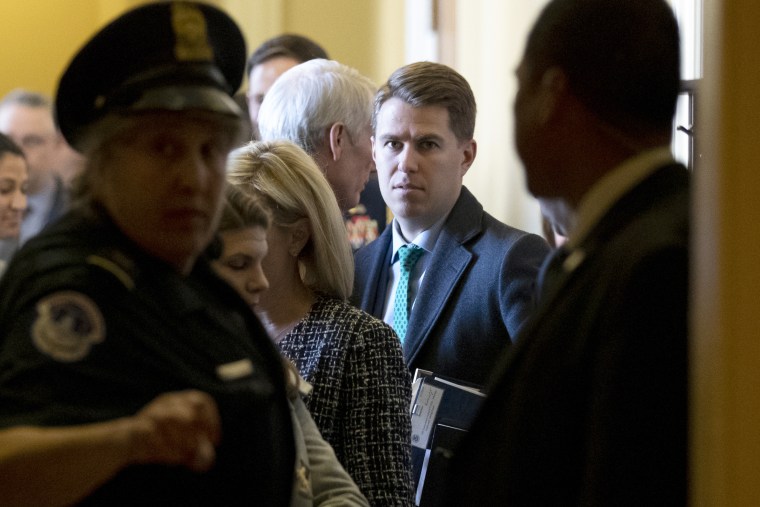By most measures, the United States is the only major Western democracy without a center-right political party. As we've discussed, by international standards, American voters have a choice between a center-left Democratic Party and a Republican Party that's further to the right than almost any competitive party in the Western world.
As a New York Times analysis explained a couple of years ago, "The Republican Party leans much farther right than most traditional conservative parties in Western Europe and Canada, according to an analysis of their election manifestos. It is more extreme than Britain's Independence Party and France's National Rally (formerly the National Front), which some consider far-right populist parties."
Are there center-right forces in the U.S. prepared to fill the apparent vacuum? This NBC News report suggests some are thinking along these lines.
More than 100 influential Republicans plan to release a call for reforms within the GOP alongside a threat to form a new party if change isn't forthcoming, a person familiar with the effort said. The statement, set to be released Thursday, involves a "Call for American Renewal," a credo that declares that it is imperative to "either reimagine a party dedicated to our founding ideals or else hasten the creation of such an alternative." The push will include 13 yet-to-be-revealed principles that the signatories want the GOP to embrace.
And if Republican officials in positions of power ignore those principles, the implicit threat is that these intra-party critics would walk away from the GOP to form a new, rival entity.
While no current Republican officeholders appear to be involved in the initiative, a Reuters report noted that some prominent voices from within the GOP are part of the "renewal" effort, including former New Jersey Gov. Christine Todd Whitman, former Pennsylvania Gov. Tom Ridge, former Transportation Secretary Mary Peters, and some former Republican members of Congress, including Pennsylvania Charlie Dent, Virginia's Barbara Comstock, Wisconsin's Reid Ribble, and Oklahoma's Mickey Edwards.
Miles Taylor, the former Homeland Security official who adopted the "anonymous" pseudonym, and Evan McMullin, the former chief policy director for the House Republican Conference who ran for president in 2016, are both reportedly taking active roles.
If this sounds vaguely familiar, it's not your imagination. Reuters reported in February that dozens of former Republican officials, "who view the party as unwilling to stand up to former President Donald Trump and his attempts to undermine U.S. democracy," had held preliminary discussions about creating a new center-right party. The major players included some of the aforementioned names.
They're not alone in thinking along these lines. Late last year, former Defense Secretary William Cohen, a lifelong Republican who spent a quarter-century in Congress, told CNN, "Maybe it's time for a new party. One that abides by the rule of law, abides by balanced budget opportunities, fiscal responsibility, but also faithful to the people of this country who vote to elect them."
Some skepticism is probably in order. Current GOP leaders will almost certainly ignore the contingent's appeals for "reforms," and since the initiative appears to include zero current elected officials, the reformers don't appear to have any real leverage over the larger Republican Party.
It's also unclear just how much appetite there is among rank-and-file GOP voters for some new, center-right entity. If Republican officials are more concerned about Trumpists sticking with the party than frustrated moderates, then the reformers won't see the kinds of changes they believe are necessary.
But this isn't necessarily trivial, either. Donald Trump, for example, published a meandering tirade online yesterday, and while the missive wasn't altogether coherent, it bashed the reformers' initiative. The fact that they were able to get the former president's attention -- and draw his ire -- suggests some in the party aren't laughing off the project altogether.
What's more, there are broader political perceptions to consider. Launching a successful political party is extraordinarily difficult -- it requires money, organizing, and electoral demand -- but the fact that this conversation is underway at all, and some prominent GOP voices are involved, reinforces larger perceptions about the contemporary Republican Party having gone mad.
It's reminiscent of the conversation about Rep. Liz Cheney's (R-Wyo.) ouster from the House GOP leadership. Some in the party are convinced the electoral impact will be meaningless, since most Americans don't know or care about who the #3 Republican is in the U.S. House. There's likely some truth to that.
But the more voters see headlines about Liz Cheney failing to pass the GOP's ideological tests, coupled with reports of Republican moderates threatening to form a third party, the more the American mainstream is reminded of the GOP's radicalism -- a likely focus of the Democratic Party in the 2022 (and 2024) elections.

